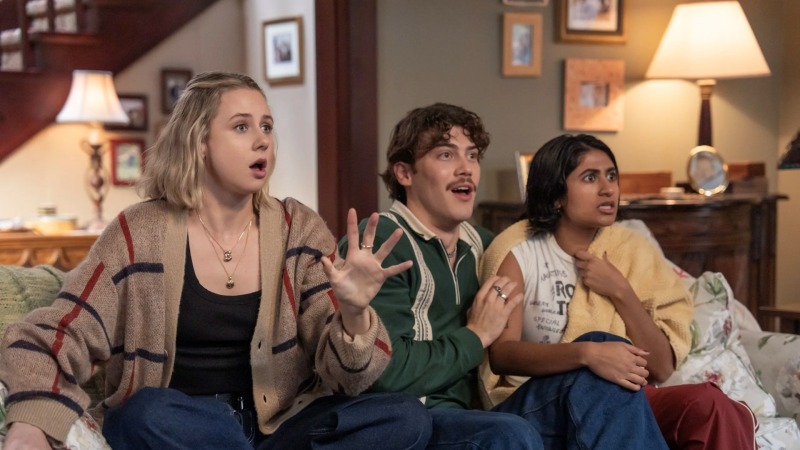The Kids Are Always Sunny in FX’s Gen Z Sitcom Adults

We have finally reached the point in time where it’s up for Gen Z to have a comedy about a 20-something friend group that defines their generation. Until now Zillennials had to deal with Gen X’s reheated nachos of Friends reruns in endless syndication. If not that, they became fixated on Lena Dunham’s millennial-focused Girls, which some audiences oddly over-glorified to the point where they failed to see its satirical elements. Ben Kronengold and Rebecca Shaw’s FX comedy series, Adults, which follows a group of early 20-something friends living under one roof in Queens, cheekily references both shows on separate occasions. Through its subtle nods, Adults makes it clear that it wants to stray away from self-serious satire or sitcom-like elements.
Instead it adopts the spirit — and oddly enough, episodic plotting— of FX’s most notorious series, It’s Always Sunny in Philadelphia, for a younger, albeit still deranged audience. Like being in your 20s, the series takes a while to find its own identity, but it demonstrates the complicated problems that come with being this age in the 2020s in a welcoming absurdist lens and with thorough charm.
In Kew Gardens, Queens, Samir (Malik Elassal) resides in the same childhood home with his childhood best friend Billie (Lucy Freyer), his long-time college friends Anton (Owen Thiele) and Issa (Amita Rao), and Issa’s partner Paul Baker (Jack Innanen). Fortunately for them, Samir’s parents are abroad, so he has been grandfathered in to look after the house, where everyone lives for free. Thankfully, this comedy isn’t about the challenges of living in New York City—God knows we have enough of those—but rather it’s about the ridiculousness of growing up in modern NYC without a manual.
Mishaps in the six episodes screened for the press include dealing with medical proxy when parents aren’t around, online dating (this may be the first media I’ve seen that references Feeld), being that weird adult who keeps going back to their high school where they peaked, becoming an online delivery driver, and roasting a chicken at your first dinner party. The ensemble’s collective inability to overcome each obstacle is what creates a sense of charming unity between them. Their airheaded egos cause them to stumble in front of each obstacle, which can lead to solid comedy or, at the very least, some hilarious comedic premises. For instance, in one episode, Anton’s compulsion to make friends with everyone he meets—to which Issa and Billie dubs him “friend slut”—leads him to unintentionally invite a wanted stabber (a funny Ray Nicholson guest appearance) into their house.
What works in Adults‘ favor is the comedic ensemble, who all give their roles a certain charm and bravado.
As Samir, Elassal brings thoughtfulness to his familiar, arrested-developed immaturity. Though Samir means well, he doesn’t know much about proper social behavior or the certain tasks of the adult lifestyle. He is also not lazy, which is a nice change from the usual lazy 20-something male leads you’d see in millennial characters, influenced by Judd Apatow. Billie, Freyer’s character, is the quintessential “girl failure,” as she is continually placed in increasingly worse circumstances per episode. As the series progresses, Freyer delivers some stellar, vulnerable work, and Billie is the most complex of the bunch. Thiele is a joy, as his Anton is the most logistically sound and responsible of the group, though he frequently gives in to the shenanigans of his friends, mainly Issa. Rao is a genuine highlight as Issa, as she exudes a mini-Ilana Glazer energy, characterized by spunky quick wit, fearlessness, and energetic intensity. Jack Innanen’s Paul Baker is a sexually fluid himbo who goes along with either Samir or Issa’s misadventures, but because he receives little attention, his character never quite comes to fruition.
-

-

-

-

-

-

-

-

-

-

-

-

-

-

-

-

-

-

-

-

-

-

-

-

-

-

-

-

-

-

-

-

-

-

-

-

-

-

-

-








































